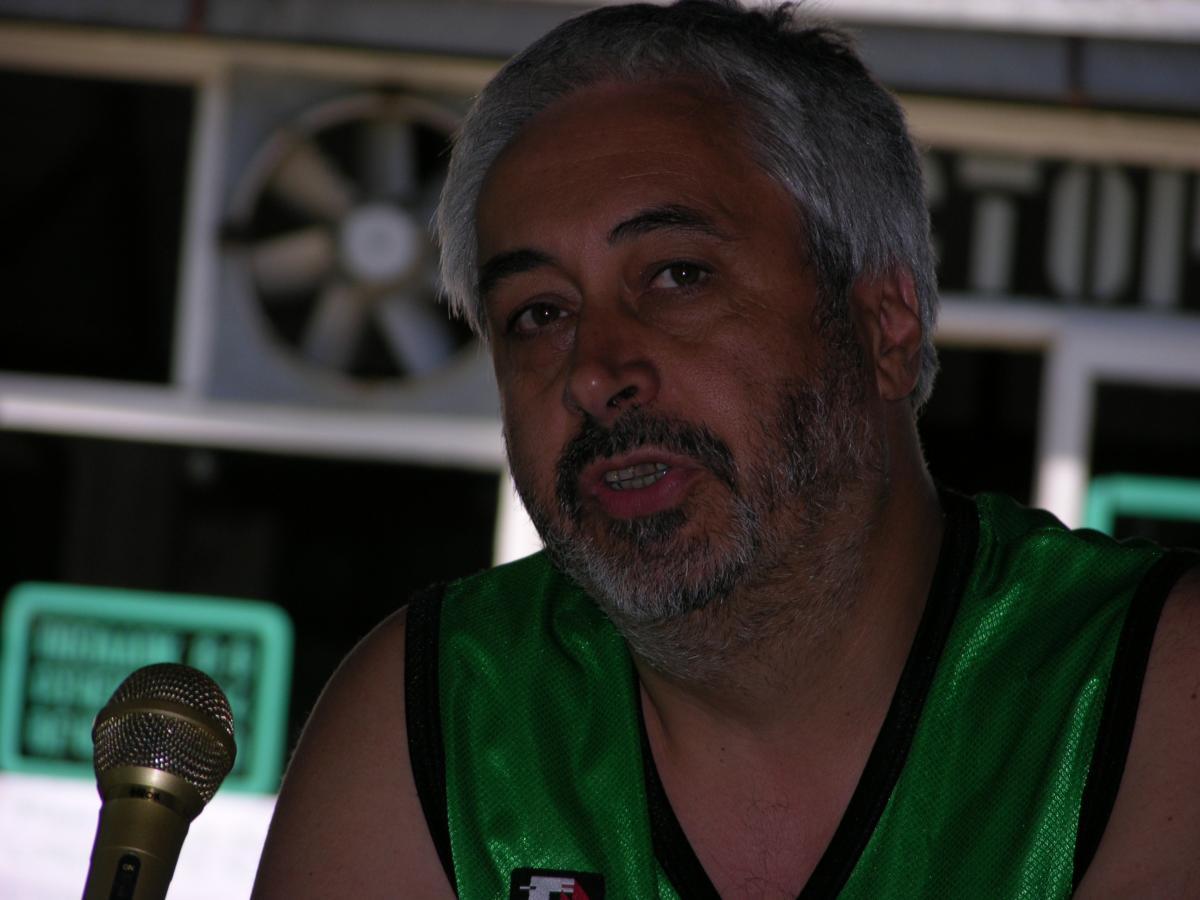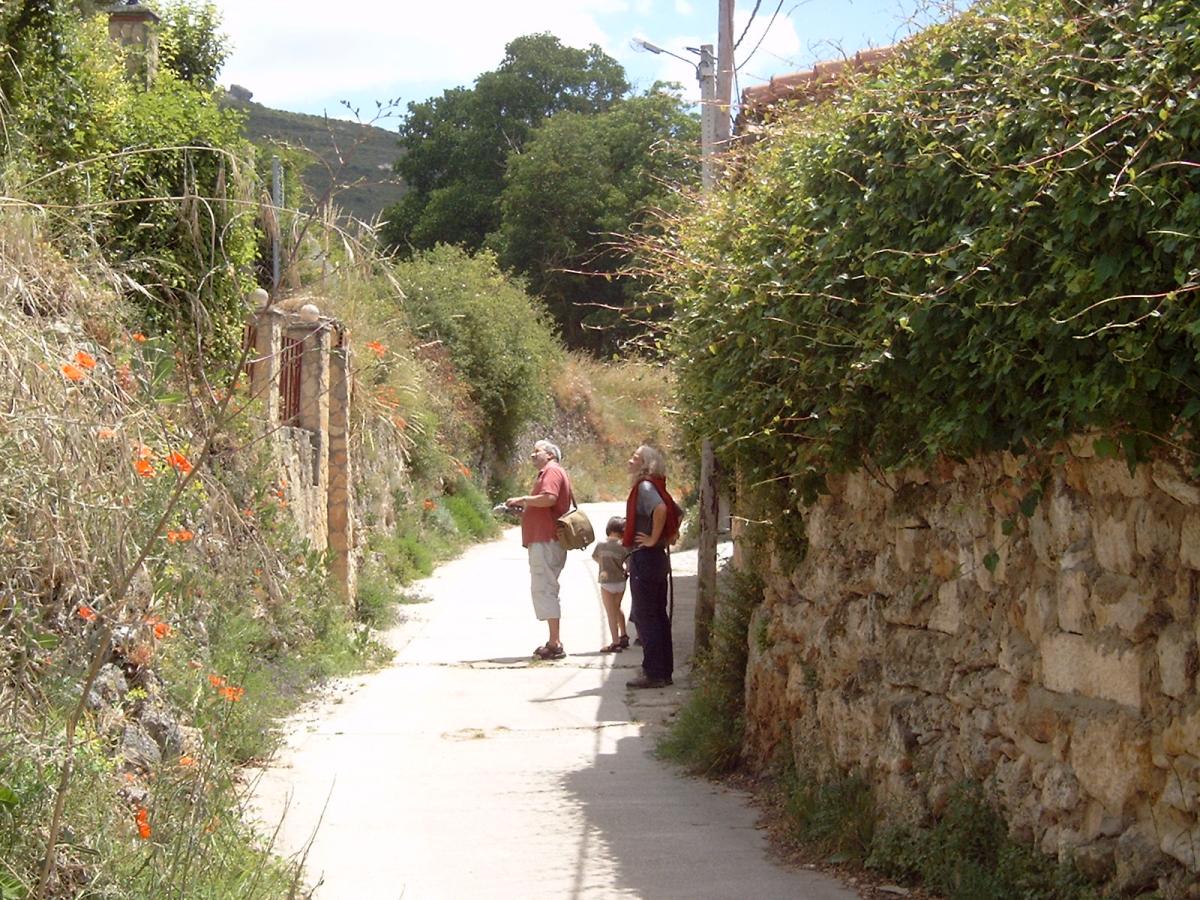Howard Clark (* 6 March 1950, ✝ 28 November 2013)
 On 28 November Howard Clark, pacifist, anarchist, chair of War Resisters' International, friend, and so many more things, died unexpected of an heart attack. It is only slowly sinking in that Howard, who has been an important companion during the last 20 years of my life, is no longer with us.
On 28 November Howard Clark, pacifist, anarchist, chair of War Resisters' International, friend, and so many more things, died unexpected of an heart attack. It is only slowly sinking in that Howard, who has been an important companion during the last 20 years of my life, is no longer with us.
I knew Howard for almost 20 years, since I got involved with War Resisters' International, and I can't really imagine WRI without him.
I first met him probably in November 1994, when I visited the WRI office in London for the first time shortly before the Triennial conference in São Leopoldo in Brazil in December 1994. I went to London for a week or so to volunteer in the office and to help with some of the preparation work for the Triennial. Howard was very welcoming, and I enjoyed quite some discussion and the communal lunches at the WRI office, with a mix of gossip and political discussions - and Howard was good at both, it has to be said.
I met him again at the Triennial itself, and then a year later at the WRI Council meeting in Urnieta in the Basque Country, state of Spain. His knowledge of nonviolence, but even more so of nonviolent movements in many parts of the world was always impressive, and a resource to tap into. A year later, in 1996 at the WRI Council in Liege, Belgium, we met again, and I joined the committee preparing the next WRI Triennial, which was to take place in Croatia in 1998. That meant we worked closer together and met more often - Howard was still on the WRI staff then - and his knowledge of the Balkan region, and his involvement with the Balkan Peace Team, were very important during the preparation of the Triennial conference. Howard also was part of the discussions on a project on Nonviolence and Social Empowerment, which grew out of his proposal for a series of consultations with armed struggle movements, which had been discussed at the Brazil Triennial.
Howard was a very good organizer, and he knew War Resisters' International and its network of organisations very well, so he could predict where tensions could arise (even though he somtimes liked to polarise too). When WRI discussed an updated version of its Statement of Principles, he facilitated many of the discussions (which went on for a few years), and managed to find quite some compromises, so that in the end the statement was approved by consensus - not an easy task.
 Howard left the WRI office in late 1997 and moved to Spain, to live with his partner Yolanda. While I joined WRI as Treasurer then, Howard initially joined the Executive Committee - a mistake, as he and others acknowledged later, as he had left staff only very recently (he then resigned from the Executive Committee after one year). He nevertheless remained on the WRI Council, and contributed to many discussions within WRI, and probably was one of its most active Council members. He also joined the Nonviolence and Social Empowerment Committee (at the Triennial in Croatia, he had co-facilitated a theme group on the theme), which was formed to organise an international study conference on the theme. I too joined the same committee, and later worked part-time from Oldenburg in Germany to organise the conference, which took place in February 2001. On this commitee, working with Howard, I really valued his broad knowledge of nonviolent movements all over the world, and his many contacts within these movements - an invaluable resource for the preparation of the conference. Even though Howard in the end did not participate in the conference, I think it would have looked very different wouldn't he have been part of the organising committee.
Howard left the WRI office in late 1997 and moved to Spain, to live with his partner Yolanda. While I joined WRI as Treasurer then, Howard initially joined the Executive Committee - a mistake, as he and others acknowledged later, as he had left staff only very recently (he then resigned from the Executive Committee after one year). He nevertheless remained on the WRI Council, and contributed to many discussions within WRI, and probably was one of its most active Council members. He also joined the Nonviolence and Social Empowerment Committee (at the Triennial in Croatia, he had co-facilitated a theme group on the theme), which was formed to organise an international study conference on the theme. I too joined the same committee, and later worked part-time from Oldenburg in Germany to organise the conference, which took place in February 2001. On this commitee, working with Howard, I really valued his broad knowledge of nonviolent movements all over the world, and his many contacts within these movements - an invaluable resource for the preparation of the conference. Even though Howard in the end did not participate in the conference, I think it would have looked very different wouldn't he have been part of the organising committee.
I joined the WRI staff in May 2001, and even though he was no longer working in the office, nor living in London, nor on the Executive Committee, his presence could still be felt. He was around by email, criticising and supporting the work of the office, and I often asked him for his opinion or for advice, or to write an article. He still was on Council, and still one of its most active members. But also his institutional knowledge was invaluable, as he had been involved in so many networks and small working groups on behalf of WRI when he was on WRI staff, that it was at times hard to untangle without his help.
Since the Croatia Triennial in 1998, WRI introduced international seminars alongside its Council meetings, to cover some themes more in depth, and to be able to fundraise for some of the travel. Howard always played a role in these seminars, as facilitator or resource person, and mostly took this role serious. He was one we in the office could always rely on.
In addition, Howard was still involved in Peace News, via his role in Peace News Ltd and Peace News Trustees. As I also got involved with Peace News - often as author, but also supporting the paper behind the scenes, and later for a few years as member of the board of Peace News Ltd - we were involved in quite some discussions on the content or direction of the paper. I think we both agreed that Peace News did no longer fulfil a useful role for WRI, but also on the chances for a relaunched British paper. We might have disagreed on other things, but this did never have a negative impact on our relationship.
There are so many more things to say. When WRI launched its Nonviolence Programme in 2005, Howard was again there to support it. I still remember a meeting of the Nonviolence Programme Committee at Howard's and Yolanda's house in Coventry, where they lived for a year, which I enjoyed a lot, even though I do not remember any of the discussions we had there. Howard participated in the work for WRI's Handbook for Nonviolent Campaigns, among many other things. And in preparation for becoming Chair of War Resisters' International, he joined the organising committee for the Triennial conference in Germany in 2006.
My last six years (or 6 1/2 years) in the office, I worked with Howard as Chair, which meant an even closer relationship. I don't know how often we asked him to write something for WRI's Broken Rifle, especially when we needed something more programmatic or linking issues together. And then the WRI conference in India was probably born out of his idea, even though it wasn't initially planned to be a WRI Triennial. It also was Howard who got Dominique Saillard back into WRI, and convinced her to become WRI's Treasurer, a position which had been vacant for some time.
I left WRI at the end of 2012, and I assume it was Howard who came up with the crazy idea of singing "Born to be Wild" with slightly altered lyrics at my last Council meeting in Bilbao in October 2012. This was a very emotional event for both of us, having worked together in different roles over so many years.
The last time I met Howard was in October 2013 in Madrid, when I visited him for lunch at his home. As always, we discussed War Resisters' International, but we also discussed other possible future projects, which now will need to happen without him - or won't happen.
 Howard's and Yolanda's flat in Madrid and their house in Tubilla del Agua were always open, no matter if I was passing through on holidays or on WRI travel, and that probably applies to others too. I stopped over in Tubilla del Agua (between Santander and Burgos) several times when cycling through Spain, the last time in summer 2012, and I always enjoyed my stay. Of course, we couldn't avoid political discussions - especially around WRI's themes and issues - but that wasn't all. He was a fun person to be around, even though I didn't share his interest in football at all...
Howard's and Yolanda's flat in Madrid and their house in Tubilla del Agua were always open, no matter if I was passing through on holidays or on WRI travel, and that probably applies to others too. I stopped over in Tubilla del Agua (between Santander and Burgos) several times when cycling through Spain, the last time in summer 2012, and I always enjoyed my stay. Of course, we couldn't avoid political discussions - especially around WRI's themes and issues - but that wasn't all. He was a fun person to be around, even though I didn't share his interest in football at all...
I still don't know what Howard's death will mean for me. I don't think I would be the same person I am now without him. I don't know - in fact, I don't think I would have gotten that deeply involved with WRI without Howard (and Dominique - Howard can't take all the credit here), and wouldn't have ended up working almost 12 years in the WRI office.
My thoughts go out to Yolanda and their two children, Ismael and Violeta.
Howard, I will miss you.
